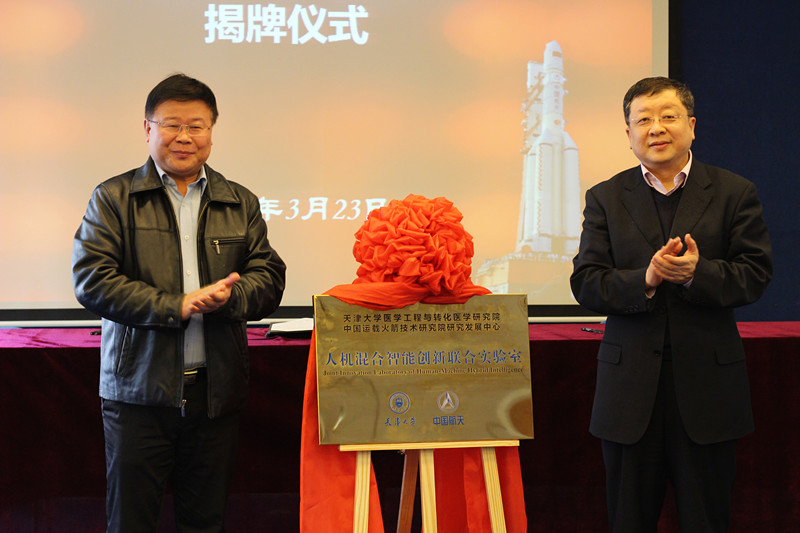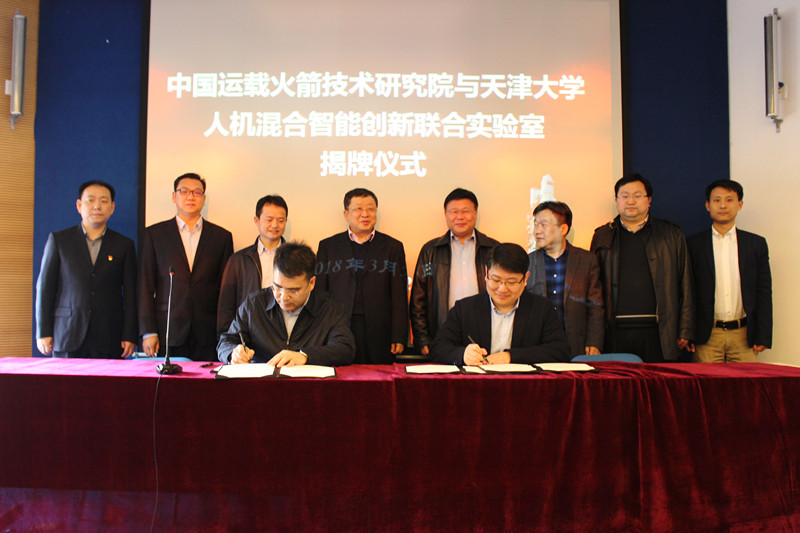On March 23, the Joint Innovation Laboratory of Human-Machine Hybrid Intelligence established by TJU and China Academy of Launch Vehicle Technology (hereafter referred as CALT), was inaugurated at TJU’s Weijin Road Campus. This is the first joint research institution of CALT in Tianjin. It is of great significance to support the development of aerospace models and industry layout of the integration of military and civilian, and meet the demands of the new generation of artificial intelligence.Yuan Yingjin, Vice President of TJU, and Wang Guoqing, Vice President of CALT attended the signing and unveiling ceremony.
“Human-machine hybrid intelligence” refers to the introduction of human role and cognitive model into the artificial intelligence.

“Hybrid-augmented intelligence of Human-machine collaboration” is one of the five important directions in the Development Planning for a New Generation of Artificial Intelligence issued by the State Council in July, 2017. Aiming to improve a new generation of overall traction technology of space artificial intelligence and strengthen the development, demonstration and validation ability of human-machine hybrid intelligent engineering, the laboratory will focus on the human-machine interaction problems such as space task of semi-physical simulation exercise and mobility of space robots which will provide strong support for the sustainable development and deep application of human-machine hybrid intelligence in the space field, as well as the extension of military and civilian integration into the field of intelligent medical engineering.Yuan Yingjin, the vice President of TJU, commented that the aerospace industry was one of the most complex systematical engineerings in human history and it embodied a country’s comprehensive national strength. It is therefore incumbent on TJU to integrate the school’s wisdom in order to contribute to China’s aerospace construction.

As the birthplace of China Aerospace, CALT maintains close and benign cooperative relationship with TJU. The establishment of the laboratory would promote TJU to meet the national strategic demands, vigorously develop space technology and train first-class technical personnel.Wang Guoqing, the Vice President of CALT, pointed out that artificial intelligence represented the general trend of space technology development. TJU boasts great strength in developing human-machine hybrid intelligence such as brain-computer interaction and neural engineering. The establishment of the laboratory will give full play to the advantages of both science and technology, explore a new mode of civil-military integration and synergy innovation, and strive to cultivate talents. CALT will support running the laboratory and contribute to the construction of space power.CALT was founded on November 16, 1957. It is the largest research, design, trial, test and production base for missile weapons and carrier rockets in China.
By Song Shuang
Editors: Yin Wei & Doris Harrington






